|
|
|
Sort Order |
|
|
|
Items / Page
|
|
|
|
|
|
|
| Srl | Item |
| 1 |
ID:
143278
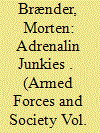

|
|
|
|
|
| Summary/Abstract |
This article calls for military sociologists to contribute to the study of excitement motivation. Bravery has always played a dominant role in depictions of soldiers in popular culture, and the importance of concepts similar to excitement has been recognized in disciplines adjacent to sociology for decades. Given the transgressive nature of combat, we would intuitively expect soldiers to have their need for thrilling experiences satisfied during deployment, and hence their level of excitement motivation to have decreased when they return from war. However, the opposite seems to be the case. Soldiers return wanting more, and we lack a theoretical explanation why this is the case. This article starts closing this gap by offering one possible reason. And, most importantly, it calls for other researchers to offer other explanations as well. The explanation suggested here is that just like real drug addicts build up a physiological tolerance to narcotics, soldiers can become “adrenalin junkies” because their tolerance toward excitement is “pushed upward” by being exposed to danger. This explanation is tested, and finds partial support, using panel data with soldiers from two Danish companies, serving in Helmand, Afghanistan in 2011.
|
|
|
|
|
|
|
|
|
|
|
|
|
|
|
|
| 2 |
ID:
143285


|
|
|
|
|
| Summary/Abstract |
In response to China’s military modernization and growing anti-access/area denial capabilities, the US military has adopted an “Air Sea Battle” (ASB) concept entailing extensive strikes on the Chinese mainland. ASB has been embraced at the Pentagon and increasingly affects procurement decisions. Critics argue that ASB creates grave escalation risks and may incite an expensive arms race. Less discussed, but also of serious concern, is that ASB was adopted with little to no civilian oversight, in a case of “structural inattention.” This failure of civil–military relations derives from institutional factors such as the nature and composition of the White House staff, as well as from the administration’s pragmatic rather than strategic approach to China. It has also been facilitated by “subterranean factors” including the interests of influential military contractors and the military’s own inclination toward conventional warfare.
|
|
|
|
|
|
|
|
|
|
|
|
|
|
|
|
| 3 |
ID:
143282
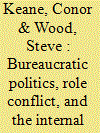

|
|
|
|
|
| Summary/Abstract |
Among the many challenges confronting the United States and its allies in Afghanistan were cohesion and communication problems in state-building programs. Merging role theory and bureaucratic politics approaches, this article argues that US Provincial Reconstruction Teams (PRTs), the composite groups charged with implementing these programs, suffered from incompatibilities between sectors of government, among which the military was dominant. US PRTs were affected by role conflict, resulting from varying and often competing organizational cultures with divergent role conceptions.
|
|
|
|
|
|
|
|
|
|
|
|
|
|
|
|
| 4 |
ID:
143283
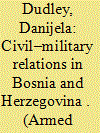

|
|
|
|
|
| Summary/Abstract |
Nearly two decades after the civil war, Bosnia and Herzegovina has yet to establish democratic control over its armed forces. While there is a widespread consensus that democratic consolidation is desirable, the process has been impeded by continuing challenges to state legitimacy. With three ethnic groups challenging state legitimacy, the reform efforts have been overshadowed by each group’s fears of others’ future intentions, leading thus to the maintenance of three armies for a decade after the war and nondemocratic defense relations to this day. The levels of challenges to state legitimacy, however, have varied. Due to the changing political environment, the early 2000s were characterized by a relative absence of nationalist rhetoric, allowing thus significant reforms of the defense sector. However, with reemergence of challenges to state legitimacy in 2006, the reform efforts came to a stalemate, leaving the newly established defense institutions without the capacity necessary for their functioning.
|
|
|
|
|
|
|
|
|
|
|
|
|
|
|
|
| 5 |
ID:
143287
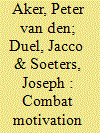

|
|
|
|
|
| Summary/Abstract |
This research note presents the findings of a survey study among veterans from the Netherlands armed forces who participated in operations since the Second World War. The aim of the study is to reveal the veterans’ experiences with respect to their combat motivation—or lack thereof—and actual participation in combat actions. The data demonstrate that over time the degree of combat motivation has increased. The data also demonstrate that those who participated in combat actions and were motivated to do so are generally positive about operational and social–psychological aspects of the organization and its surroundings. The implications of these findings are discussed.
|
|
|
|
|
|
|
|
|
|
|
|
|
|
|
|
| 6 |
ID:
143288
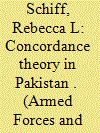

|
|
|
|
|
| Summary/Abstract |
In Zulfiqar Ali’s article regarding concordance theory in Pakistan, Dr. Ali asserts that concordance theory does not explain domestic military intervention in Pakistan. He also suggests that concordance theory superimposes a Western theoretical model on Pakistan, like Huntington’s theory of objective civilian control. In response to Dr. Ali’s claims, this article reiterates how concordance theory can in fact explain why Pakistan has suffered from domestic military intervention—the alienation of the Bengali community and subsequent lack of agreement among the three concordance partners being one significant factor. Additionally, Huntington’s theory focuses on institutional and dichotomous civil–military relations, grounded in the post–World War II US case study. By contrast, concordance theory views the relationship between military and society from both cultural and institutional perspectives and embraces those indigenous qualities that may encourage or discourage domestic military intervention.
|
|
|
|
|
|
|
|
|
|
|
|
|
|
|
|
| 7 |
ID:
143279
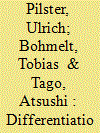

|
|
|
|
|
| Summary/Abstract |
Which factors drive the onset of genocidal violence? While the previous literature identified several important influences, states’ military capabilities for conducting mass-killings and the structure of their security forces have received surprisingly little attention so far. The authors take this shortcoming as a motivation for their research. A theoretical framework is developed, which argues that more differentiated security forces, that is, forces that are composed of a higher number of independent paramilitary and military organizations, are likely to act as a restraint factor in the process leading to state-sponsored mass-killings. Quantitative analyses support the argument for a sample of state-failure years for 1971–2003, and it is also shown that considering a state’s security force structure improves our ability to forecast genocides.
|
|
|
|
|
|
|
|
|
|
|
|
|
|
|
|
| 8 |
ID:
143286


|
|
|
|
|
| Summary/Abstract |
Problems associated with environment and climate change have long been in the headlines. However, research on the effects that such problems might have on civil–military relations has been limited so far. This article examines civil–military cooperation caused by environmental problems in the recent decades particularly in developing countries. It employs Pion-Berlin and Arceneaux’s theoretical framework on military missions and civilian control and then looks at the case of Botswana. This article argues that the recent decade has seen an increase in civil–military cooperation due to new security concerns over environmental problems.
|
|
|
|
|
|
|
|
|
|
|
|
|
|
|
|
| 9 |
ID:
143284


|
|
|
|
|
| Summary/Abstract |
The growing trend toward the securitization of infectious disease has legitimated a role for national militaries in responding to public health crises. This apparent “militarization” of health has met with resistance from the health and security sectors alike, who argue that it risks politicizing health outcomes while also draining limited military resources. This article attempts to place such concerns within the broader historical context of military involvement in public health. With specific reference to pandemic influenza—a disease of great historical import and a current policy priority in the context of securitized global public health—this article details the pedigree of military involvement in fighting the disease and draws on the established record to demonstrate the role that militaries can play in improving public health outcomes. The article argues for an ongoing military role in the global fight against pandemic influenza, both in augmenting civil influenza programs and in improving their own preparation and response mechanisms for future pandemics.
|
|
|
|
|
|
|
|
|
|
|
|
|
|
|
|
| 10 |
ID:
143280
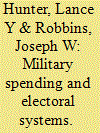

|
|
|
|
|
| Summary/Abstract |
The implications for funding a military, though important, are still not fully understood. Existing work often surmises that military spending is higher in majoritarian electoral systems that are predicated on personalistic ties. However, further examination casts doubt upon these findings. Accordingly, we present a pooled time-series cross-sectional analysis of military spending and electoral institutions and we find that party-based electoral systems, rather than majoritarian ones, foment higher military spending levels—which we attribute to these systems’ predilection for public goods spending. These results are robust even when a host of control measures and four different military spending metrics are employed.
|
|
|
|
|
|
|
|
|
|
|
|
|
|
|
|
| 11 |
ID:
143289
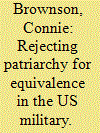

|
|
|
|
|
| Summary/Abstract |
This article is a response to Anthony King’s “Women Warriors: Female Accession to Ground Combat.” King rightly asserts that the accession of women to combat roles is a notable historical departure in warfighting. He critiques Brownson’s conceptual ideal of “equivalency” as a potentially profound force of transformation of gender relations in the military. While conceptually progressive, he errs in framing the potential transformation within the concept of “patriarchy.” Further, King is unable to recast binary gendered language to acknowledge fully the concept of “kinship.” For females to maximally succeed in the military, and particularly in combat roles, patriarchy as the defining explanation for male–female interaction must be discarded and the enabling concepts of equivalency and kinship must be embraced. The continued strength of military organizations and the individuals within them emerges from the reciprocity of these two concepts.
|
|
|
|
|
|
|
|
|
|
|
|
|
|
|
|
| 12 |
ID:
143281


|
|
|
|
|
| Summary/Abstract |
This article addresses a gap in the scholarly literature. Students of militarism do not link the propensity to use force to the broader issue of what type of civilian control may restrain the use of force. Similarly, even students of civilian control who acknowledge that civilian control and military restraint do not necessarily go hand in hand have not questioned the extent to which we should decouple the two different processes as different modes of control rather than different effects of control. A revised conceptualization of civilian control is therefore offered that distinguishes between two modes of civilian control over military affairs: control of the military, which concerns itself primarily with the military organization, and control of militarization, which draws on the political discourse in which the citizenry plays an active and autonomous role aimed at subjecting the decision to use force to a deliberative process that addresses its legitimacy.
|
|
|
|
|
|
|
|
|
|
|
|
|
|
|
|
|
|
|
|
|